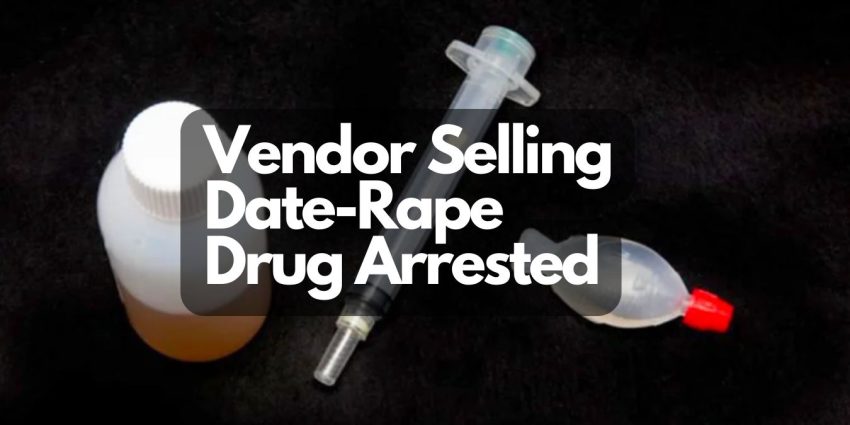On Thursday, September 7th, a Darknet vendor from Missouri was sentenced by Federal Judge Douglas to serve 10 years in federal prison. His crimes include conspiring to distribute controlled substances over the dark web and being a felon in possession of a firearm.
Andrew Mitchell, 45, pleaded guilty to selling large amounts of cocaine, heroin, methamphetamine, and 1,4-butandediol (also known as the date-rape drug) across the U.S. through the “TrueNextDay” darknet market vendor profile on White House Market.
The “TrueNextDay” Empire
In a plea agreement, Andrew Mitchell admitted to selling heroin, methamphetamine, cocaine, and 1,4-butandediol through a darknet marketplace known as the ‘White House Market’ (a now-defunct marketplace). Mitchell admittedly acted under the alias ‘TrueNextDay’ to advertise and distribute narcotics.
For those that don’t know, the dark web is a hidden layer of the internet that isn’t accessible through search engines and requires specific software for users to access it. The dark web is used as an online black market for the distribution of illegal and legal products and uses an encrypted Tor network to hide the identities of users. It’s not all bad and has solid use cases, but it’s also home to Darknet markets for drugs and other items.
Under the ‘TrueNextDay’ alias, Mitchell regularly posted updates with regard to expected shipments and available merchandise. In August 2022, TrueNextDay posted on White House Market that “The store is back up and running,” and “Re-ups for proto and BDO should land any day now, plus I have multiple brand new products that will blow your mind. This is going to be one of the most impressive collections on the darkweb when I am done.”

Between May and September 2021, Mitchell allegedly imported several packages from a distributor from Poland to distribute via the dark web. At the time, the U.S. Customs and Border Protection Mail Targeting Unit successfully identified and detained multiple shipments intended for Mitchell, containing 25 pounds of 1,4-Butanodio.
According to Federal Judge Douglas Harpool, Mitchell ran a successful dark web operation that saw up to $40,000 in transactions. On his arrest, Mitchell had around $10,000 in crypto holdings (0.22118731 Ethereum, 17.617213 Monero, 10, 202 Dogecoin, 1.0043 Polkadot, and 0.00022752 Bitcoin) and $1,120 in cash.
During Mitchell’s sentencing, the judge further stated that Mitchell’s operation “was not a little enterprise”. The suspicious activity posted by the “TrueNextDay” dark web vendor naturally caught the attention of the FBI, so an investigation began.
The Operation SpecTor vendor tracking website claimed that TrueNextDay was arrested from SpecTor, however, it doesn’t seem to be the case.
How the “TrueNextDay” was captured
In May 2021, FBI agents in Kansas City launched an investigation into the vendor profile named “TrueNextDay” on the dark web. Over the course of the ensuing months, the FBI created a buyer account on the darknet in order to view and monitor posts made by the vendor profile.
Following the investigation, FBI agents used a buyer account to order heroin, cocaine, methamphetamine, and 1,4-butandediol from the “TrueNextDay” vendor profile on the dark web.

On June 3rd 2021, a Springfield business owner informed a detective at the Greene County Sheriff’s Office of a suspicious package that had been returned to his company’s work premises.
The suspicious package was a U.S. Postal Service Priority Mail envelope with the return address of the business. However, a foreign name appeared on the envelope. This particular name didn’t match any individual associated with the company.
Upon investigation and tests performed by the Missouri State Highway Patrol Crime Lab, the package contained 28 grams of methamphetamine. The narcotics shipment had originally been delivered from Springfield to Chicago. However, an invalid address resulted in the envelope being returned to the sending address in Springfield. An inspector from the U.S. Postal Service was able to link the Springfield Mediacom Internet Protocol IP address, which was used to track the movements of the package. After some time, the package linked back to that of Andrew Mitchell.
During the months of May to September 2021, the U.S. Customs and Border Patrol was successful in intercepting multiple packages addressed to the residence of Andrew Mitchell. On September 12th, the CBP intercepted a package containing 6 kilograms of 1,4-butanediol.
Directly after these packages were seized, TrueNextDay posted an update on the dark web informing the user that the package didn’t arrive. An undeniable connection between Mitchell and TrueNextDay has now been established by agents at the FBI.
While reviewing Truenextday’s vendor profile, an investigating officer found an update section where Mitchell’s full Mitchell’s was visible. The update read “Andrew Mitchell, 632 E.Kerr St. Springfield, MO 65803” under a post titled “6-30 SHIPPING DELAY UPDATE.” A complete violation of his personal OpSec, and clearly leading Mitchell to his prison sentence. The investigation continued.
On September 24th, the CBP intercepted a package containing bottles labeled 1,4-butanediol. Investigation agents then made a controlled delivery of the package to Mitchell’s residence, where he accepted delivery of the product.
With probable cause established, the FBI executed a search warrant for Mitchell’s residence. Agents raided the premises to uncover five 1,4-butanediol bottles and a Glock handgun locked inside a safe. In addition, Mitchell’s computer was logged into the TrueNextDay vendor profile, which confirmed the link.
Arrest details

Upon his arrest in October 2021, Mitchell confessed and cooperated with investigators, granting them access to his crypto wallet. The investigators seized around $10,000 in digital crypto assets and $1,120 in cash.
Mitchell was then arrested and charged with several drug trafficking offenses, including conspiracy to distribute a controlled substance and being a felon in possession of a firearm.
Sentencing A Darknet Vendor
On September 7th 2023, Federal Judge Douglas Harpool concluded that drug trafficking convictions carry stiff prison sentences. However, the federal judge considered Mitchell’s request to serve his sentence at one of three federal prisons.
Judge Douglas Harpool sentenced Andrew Mitchell to 10 years in a Federal prison, with three years of supervised release.
Conclusion: OpSec and Operations Failure
Andrew Mitchell may have run a solid operation as “truenextday”, yet behind the scenes he failed to complete all necessary points for Operations Security. He gave his own name and address, he failed to complete steps for privacy when shipping, and inevitably, he is paying the price.
A good vendor has a good product and good operations. This also highlights further the types of vendors that the FBI will go to great measures to capture. For Mitchell, its the end of the road, and a solid 10 years of his life behind bars.

